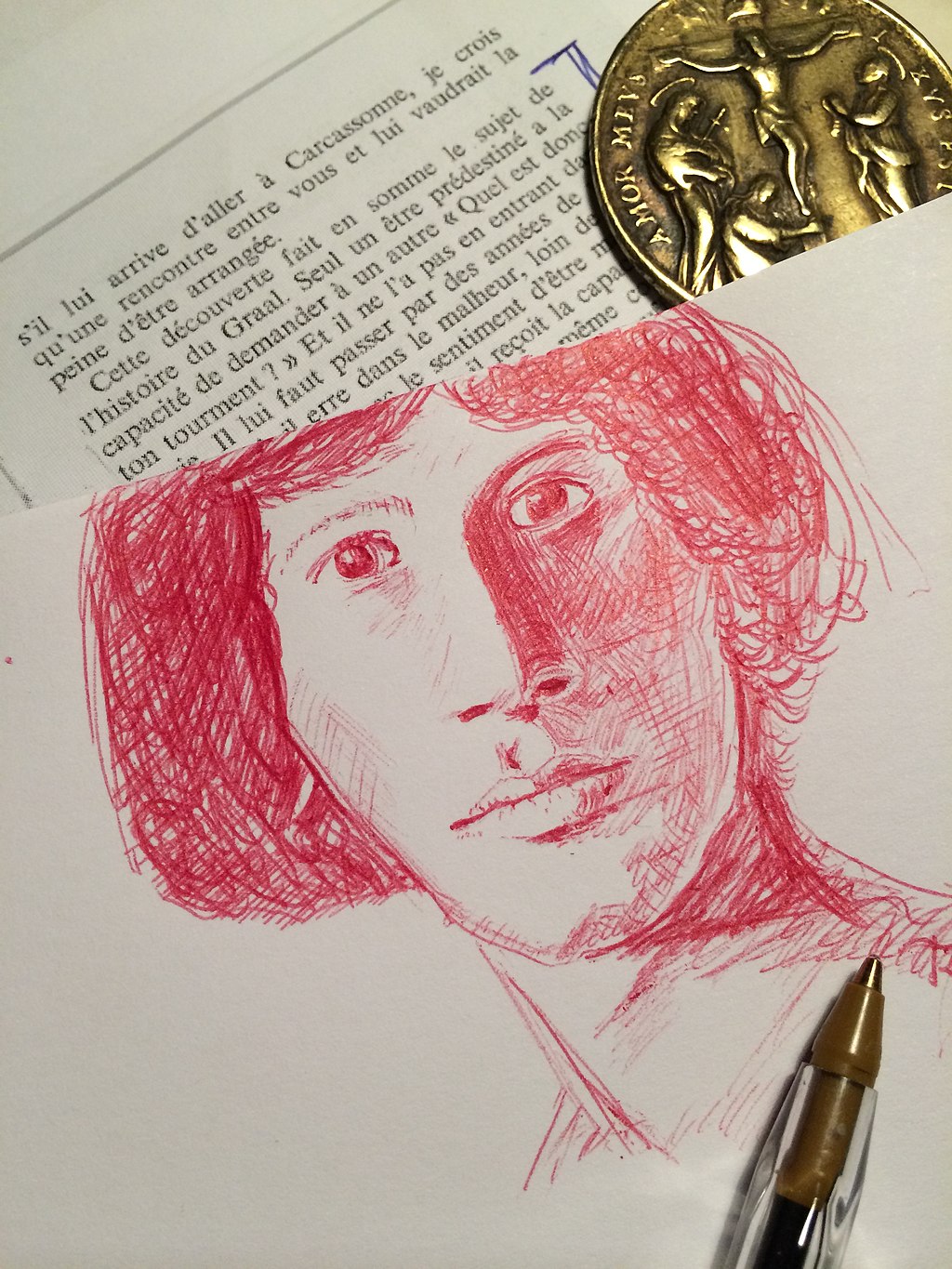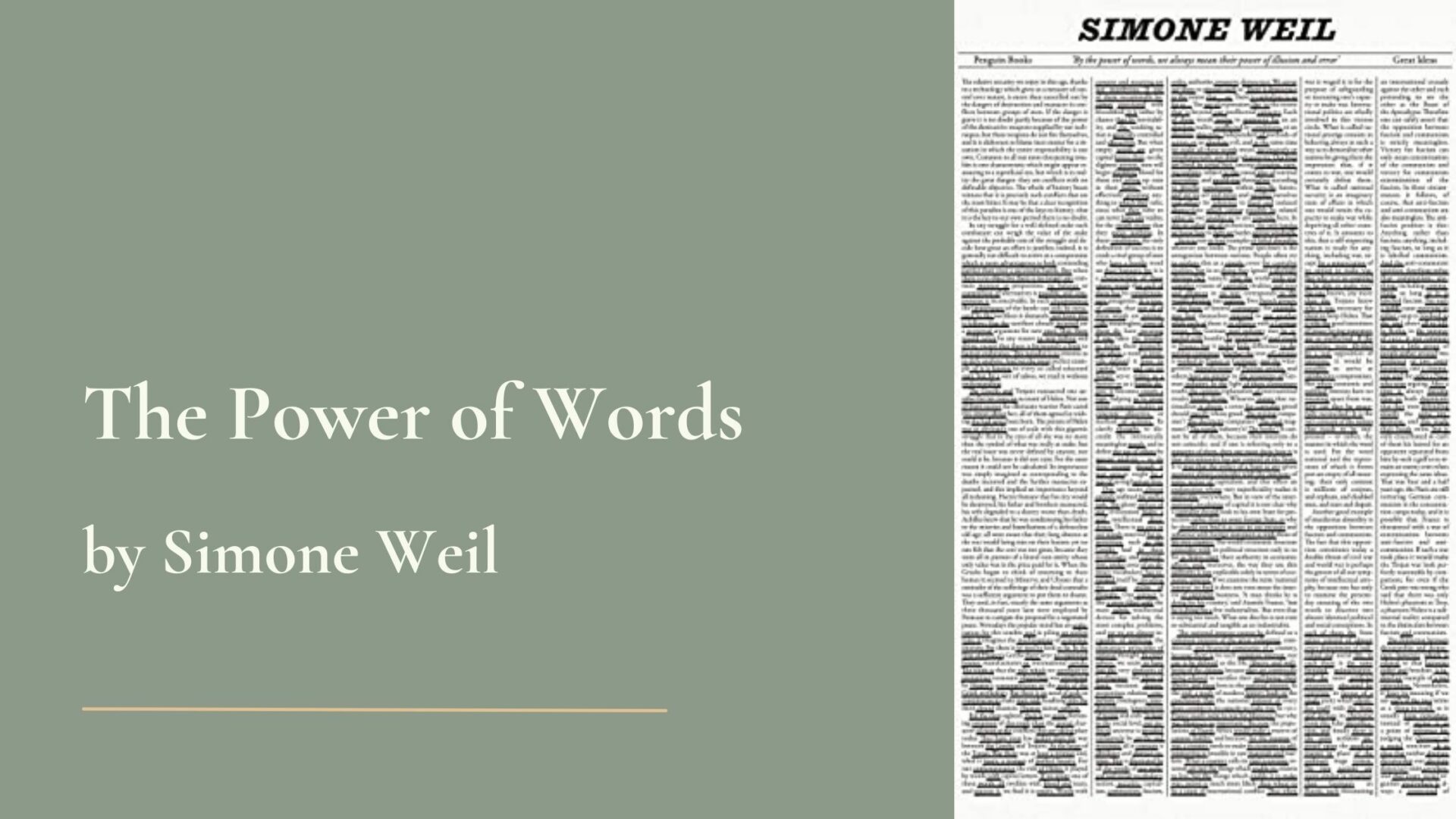
Simone Weil wrote the essay, ‘The Power of Words’, when she was twenty-five after she returned from the Spanish Civil War where she had joined the Republican faction. Weil had already visited Germany in 1932 where she was concerned about the rise of the fascists, her concerns validated after Hitler rose to power in 1933. It was during this social and political turmoil in Europe, on the brink of World War II, that Weil’s prophetic voice rang out in this searing essay. But her diagnosis of what besets contemporary society in her time can still speak to us today.
For Weil, the mis-use of words—the way they are used to obscure rather than grasp reality—was leading society into unending conflict. The greatest danger she saw unfolding was the use of ‘empty words’ given ‘capital letters’ that were used as a banner or hostile slogan, by means of which, “on the slightest pretext, men will begin shedding blood for them and piling up ruin in their name, without effectively grasping anything to which they refer…”. It is their very lack of meaning that makes it impossible to define clear objectives in a conflict or to measure whether the cost justifies the effort—and sacrifices—it demands. The result is that in such conflicts the only barometer of success is the extermination of the enemy.
For Weil, this gave contemporary conflict its unreal nature, based as it was on the use of words that do not refer to concrete reality but abstract entities. Words misused in her time, but also in ours, include those such as: nation, security, capitalism, communism, fascism, order, authority, property and democracy. “If we grasp one of these words,” Simone Weil writes, “all swollen with blood and tears, and squeeze it, we find it is empty. Words with content and meaning are not murderous.”
Take for example, the words ‘nation’ and ‘national interest.’ Weil contends that if we examine the way these terms have been used in modern history, the national interest of every State has been in retaining its capacity to make war, while at the same time depriving all other countries of it. Yet our leaders will call forth people to defend the ‘nation’ and the ‘national interest,’ as if there were a real opposition of interest between nations. If that were the case, she argues, nations would be able to negotiate and bargain for their interests. These calls amount to nothing other than defending the nation’s capacity to make war. “For the word national and the expressions of which it forms part are empty of all meaning; their only content is millions of corpses, and orphans, and disabled men, and tears and despair.”
Take for example, the words ‘nation’ and ‘national interest.’ Weil contends that if we examine the way these terms have been used in modern history, the national interest of every State has been in retaining its capacity to make war, while at the same time depriving all other countries of it.
Empty words then are illusory, meaning everything and nothing; but they are attached to real, material things. Although the word ‘nation’ and the way it is used in sloganeering is abstract and empty, the State and its affiliated apparatuses is very real. The supposed opposition between fascism and communism was an imaginary distinction for Weil, on closer analysis she believed they actually reflected “identical political and social conceptions.” But in her time, two very real oppositional political organisations existed whose aim was complete power and elimination of the other, with people on both sides willing to die and to kill for these words. “Corresponding to each empty abstraction there is an actual human group…”
Weil’s diagnosis was that words were no longer used as signs to help us grasp some aspect of concrete reality. But even more dire than that, she argued that we have also lost the capacity to use words with measure and proportion. Phrases such as ‘to the extent that’ and ideas such as degree, limit, comparison, contingency and interdependence, amongst others, are no longer used. For example, “There is democracy to the extent that … or: There is capitalism in so far as …” Instead, words are used as if reflecting an absolute, immutable reality, and “at the same time we make all these words mean, successively or simultaneously, anything whatsoever.”
Words lose their meaning when they become reified as things in themselves, rather than the means to judge and ascertain the state of social structures. We essentialise people and parties as belonging inherently to certain words like dictatorship or democracy, such that, “our political universe is peopled exclusively by myths and monsters; all it contains is absolutes and abstract entities.” We seek to crush those who belong to the ‘other’ side of that abstract word. We don’t seek to examine the variations, the changing causes of phenomena, the specific conditions that give rise to them, and the limits within which they occur, in order to come up with solutions that have some discernment; solutions that actually might work because they address specific issues and have concrete objectives, other than just defeating the other side. Instead, “we act and strive and sacrifice ourselves and others by reference to fixed and isolated abstractions…”
These words resonate across the more than eighty years since Weil wrote them. It could be argued that a lack of nuance, measure and proportion in how we use our words and in our thinking is a real mark of our times. In the age of social media, clickbait, and ‘content’ creation, much discussion is levelled out to bitesize pieces, to easy arguments where you’re either for or against, to a descent into facile comparisons. The poet Kaveh Akbar made this point about why he needed time off from Twitter:
“On social media, the same rhetorical language was being used about the casting of some Marvel movie as about the leveling of a village in Syria. The same exact rhetorical algorithms of outrage were used to talk about one as the other. Our brains haven’t evolved enough to differentiate between the two. Language is language. And so I was just not in command of my compassion, the distribution and focus of my rage, and it took a while to recalibrate.”
Short attention spans and a tendency towards simplification have perhaps always existed, but this seems to be turbo charged in our current era, where the ‘content’ that reaches us is often determined by algorithms that increasingly seal us off into echo chambers. In our pandemic times this is nowhere more illustrated than in the vaccination debate. Either you are unequivocally for vaccines and worship at the altar of medical science, or you are an anti-vaxxer and believer of vast and incredible conspiracies, mainly linked to the threat of our supposed freedom. Each side goes to ‘war’ with the other with no real measure of what the multiple issues are, no discernment about how what is true is dependent on certain conditions (instead vaccines are either always good, or always bad) and in relation to a host of factors.

It is true that social media has provided a powerful platform for marginalised groups in society. Giving a voice to groups of people who have been previously left out is to be lauded, as it is redistributing some of the power (if power is also about having a platform to be heard), and there have been many instances of social media being used to mobilise movements such as #MeToo and pro-democracy protests such as the Umbrella Movement (as well as its opposite).
Source image: Wikimedia
But the nature of the platform—word limits, algorithms, scrolling that has fractured our attention—has also meant that it has flattened a lot of debate. Debate is also a good word that characterizes much of the discourse on social media, focused as it is more on winning an argument rather than having a conversation or discussion, where there might be mutual listening and an attempt to understand the ‘other side.’
In discussions of the issues of the day, we can’t seem to hold differing ideas or understandings in tension for long enough to explore nuance, tease out implications, bring underlying assumptions or commitments to the surface. By contrast, the measured and proportionate words Weil advocates the use of can allow us to discern and grasp the fuller meaning and reality of something; and if nothing is absolute, then it becomes possible to entertain the fact that a seemingly contradictory thing can also be true, to a certain extent.
We need to determine to what extent the nuances of conflicting things can be true if we are to apprehend reality properly rather than flattening it out—if we are to propose goals and solutions that actually address concrete issues rather than just merely be used for abstract sloganeering and banner waving. In that sense, for our times Weil’s call to revive the use of expressions like to the extent that, in so far as, on condition that, in relation to, is more necessary than ever.
Discernment, analysis, measured words—these are the tools which could be an antidote against what Weil termed “the swarm of vacuous entities or abstractions.” Perhaps even more than in her time, our contemporary culture cultivates this ‘swarm.’ The pandemic might have been a time for us to sit back and reflect on what we are doing and where we are headed, individually and as a society. As the world slowly opens up again, will we retreat to how things were before the pandemic, continuing to move at a breakneck pace, or will we have learnt from the past couple of years, where perhaps a space has opened up for questioning business as usual?
In Let Us Dream: The Path to a Better Future, Pope Francis touches on the need to rediscover the art of discernment. This is surely connected to Weil’s appeal to a greater discernment in how we use words, so that outcomes are based on apprehending the reality of a given situation and addressing concrete objectives, rather than the desire to compete and win against our supposed opponents.
This call for discernment is also surely linked to a contemplative approach not only to social and political issues, but also to the way in which we individually and institutionally engage in processes that are capable of this discernment, reflection and mutual listening. As Sarah Bachelard terms it, this way of being could form the basis of a ‘contemplative politics.’ She asks:

The words we use will be of significance in this process. As Weil understood, words have the power to illuminate, but also to obscure; to lead to unending conflict, but also to greater consciousness.
‘The Power of Words’ essay published in Simone Weil: An Anthology, edited and introduced by Sian Miles (Penguin Modern Classics)
Featured image source: Google Images








3 thoughts on “The Power of Words, Simone Weil”
This article seems to skirt the real issues we face with regard to words today – that being the suppression of free speech (called misinformation/disinformation) with the resultant cancellation of persons in the most cruel ways. Never have I seen such a world of lies. Words are being misused. Meanings of words are being altered (vaccine definition altered to accommodate the fact that the vax does not give immunity) New words are being created (e.g. the gender identity phenomena) Platforms for conversation have become a means of propagandizing rather than discussing – via algorithms. Twitter leadership , for instance, has an agenda, and it does not serve free speech. We are at a transformational point in history where things can go very badly.
What we have to recognize is the use of words that promote international authoritarianism. Even movements concerning the environment are being used by these authoritarians with “words” that appeal to good-hearted people but at their core will lead to power being concentrated in the hands of those who really seek control over others. Look at the ACTIONS, rather than the words of the “climate crisis” pied pipers. They live in luxury, travel on private planes to climate conferences, AND they refuse to use their words to challenge the world’s biggest polluters. Why? Fear of retaliation? What is your “social score”?
Where is TRUTH in all these words we hear in the media? Our words must serve freedom and truth. “By their fruits, you shall know them.” Not by their words.
My worst word is refugie crise. It is a word that puts the Rich countries in Europe in the center. But the real crises are the War, the narko produktion and the hunger, which make people flee their homelands.
You could say the same about climatcrise. The climat is the climat and Can not be in crisis. But our society is in crisis because of our own behavour. The climate just react naturally on our inpact.
By calling the two subjects crisis our responsability is blurred.
This article really makes me think about the words i use, and to really examine where i stand on some of the “issues” of our day.
Simone Weil is an author i need to read and discuss with others.